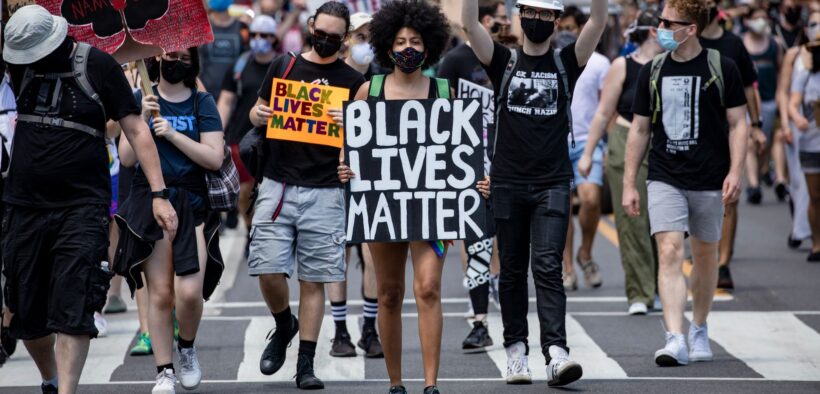Black Lives Matter: All You Need to Know About the Movement
Share

The Black Lives Matter (BLM) movement is a global organization that began in the African-American community to fight against systemic racism and violence that Black people face.
It was started in 2013 by three black women: Alicia Garza, Patrisse Cullors, and Opal Tometi. The movement has grown into arguably the largest social movement in US history.
Significance of the Movement
The BLM movement stands for equality, justice, and freedom for all Black people and works to create a world where everyone can live with dignity. It has successfully leveraged protest events to engender lasting changes in the ways that Americans discuss racial inequality.
The movement has raised awareness of the systemic racism and violence that black people face.
The BLM movement has played a significant role in shaping contemporary discourse on race and justice. It has shifted public discourse towards the movement’s agenda, as captured by social media and news reports.
The use of terms denoting the movement’s theoretically distinctive ideas, such as “systemic racism,” received more attention during waves of protest.
The Black Lives Matter movement has been a powerful force for change, fighting for equality, justice, and freedom for black people all over the world. It has significantly influenced public discourse on race and justice, bringing attention to systemic racism and advocating for equality.
Criticisms Faced by the Movement
The Black Lives Matter (BLM) movement, like any social movement, has faced criticism. Here are some of the criticisms that have been levelled against it:
- Methods of Protest: Some critics have condemned the BLM movement’s violent methods of protest. While it’s important to note that the majority of BLM protests have been peaceful, there have been instances of property damage and violence. Critics argue that these actions can detract from the movement’s message and goals.
- Comparisons to the Civil Rights Movement: Some critics have compared the BLM movement to the Civil Rights Movement of the 1960s, arguing that BLM has not lived up to the nonviolent standards of the earlier movement. However, research has found that the 2020 BLM protests were overwhelmingly peaceful, and on every measure available, last year’s BLM protests were more peaceful and less confrontational than those of the Civil Rights era.
- Perception of the Movement: There is also criticism regarding the perception of the BLM movement. Some critics feel that the movement has become more of a trend than a sustained push for systemic change.
It’s important to remember that these criticisms do not negate the significant impact the BLM movement has had on raising awareness about systemic racism and advocating for racial justice.
The movement continues to play a crucial role in shaping contemporary discourse on race and justice.
How the Black Lives Matter movement influenced policy changes
The Black Lives Matter (BLM) movement has influenced policy changes in several ways:
- BREATHE Act: The BLM, in coalition with the Movement for Black Lives, created and supported the launch of the BREATHE Act, a modern-day civil rights bill. This legislation addresses the root causes of the violence seen and felt acutely as the visibility of police and white supremacist killings has spurred global outrage.
- Pretrial Reform: The BLM movement advocated against Prop 25, a no-bail bill that would have allowed judges unprecedented power to incarcerate people accused of crimes with little due process of law.
- Anti-voter Suppression: The BLM movement endorsed and successfully organized a petition urging representatives to co-sponsor and pass critical voting rights legislation based on the late Representative John Lewis’s Voter Empowerment Act 2.
- Police Oversight: The BLM movement supported and brought attention to Rep. Jamaal Bowman’s Congressional Oversight of Unjust Policing Act (COUP Act).
- Medicare for All: The BLM movement joined U.S. Representatives and numerous organizations to endorse legislation that would expand access to healthcare for tens of millions of Americans.
- Demilitarize the Police Campaigns: In 2021, the BLM movement launched a campaign to urge President Biden to stop the militarization of police departments and ban the transfer of vehicles and equipment made for war zones.
- DC Statehood: The BLM movement led a call to action, encouraging people to send a letter to their senators to demand they support D.C. statehood. 2.
- Ending the Filibuster: The BLM movement has also been involved in efforts to end the filibuster, a legislative procedure seen by some as a tool that upholds white supremacy.
Successful Protests by Black Lives Matter
The Black Lives Matter (BLM) movement has led to several successful protests that have resulted in significant changes:
- Summer of 2020 Protests: The summer of 2020 saw a wave of protests across major U.S. cities following the deaths of George Floyd, Ahmad Arbury, and Breonna Taylor. These protests led to concrete actions such as the reallocation of policing funds, bans on chokeholds, and the redesign of Mississippi’s Confederate-inspired flag.
- Protests Following Trayvon Martin’s Death: The BLM movement can be traced back to 2013, after the acquittal of George Zimmerman, who shot and killed Trayvon Martin in Florida. The outrage following Zimmerman’s acquittal sparked a series of protests that eventually led to the formation of the BLM movement.
- Protests Following Michael Brown’s Death: The death of Michael Brown in 2014 brought the BLM movement to national attention. The unarmed teenager had been shot dead by an officer in Ferguson, Missouri, and BLM took to the streets, often in angry confrontations with the police.
- Protests Following George Floyd’s Death: The killing of George Floyd in 2020 took the movement to areas it had not reached before. The protests following his death were overwhelmingly nonviolent and led to a national reckoning on racial justice.
These are just a few examples of the successful protests led by the BLM movement. Each of these protests has played a significant role in raising awareness about systemic racism and advocating for racial justice.




















